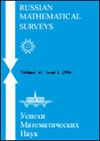Sergei Ivanovich Adian
IF 2.1
4区 数学
Q1 MATHEMATICS
引用次数: 0
Abstract
Academician Sergei Ivanovich Adian (1 January 1931 —5 May 2020), one of the most prominent Russian mathematicians, was born in the mountain village of Kushchi, in the Dashkasan district of the Azerbaijan Soviet Socialist Republic, which lies 40 kilometers away from the town of Ganja (which was soon renamed Kirovabad, but now is Ganja again). His father Ivan Arakelovich Adian was a carpenter, a son of a herdsman, and his mother Lusik was a daughter of Konstantin Truzyan, a peasant. Two years later Sergei Adian’s parents moved to Kirovabad. By the beginning of World War II they had four children. In 1941, during the first days of the war the father was conscripted and was soon killed when his unit was surrounded. Sergei, like his parents, did not speak Russian, but in 1938 they sent him to the Russian secondary school no. 11 in Kirovabad, where his mathematical abilities became obvious quite early. When he graduated, the public education department of Kirovabad applied to have him included in the Azerbaijan quota of graduates sent to study at Moscow State University. The application was declined (it was mainly ethnic Azerbaijanis that were accepted), and as a result he enrolled in谢尔盖·伊万诺维奇·阿迪安
谢尔盖·伊万诺维奇·阿季安院士(1931年1月1日至2020年5月5日)是俄罗斯最杰出的数学家之一,出生于阿塞拜疆苏维埃社会主义共和国达什卡山地区的库什奇山村,距离甘贾镇(该镇不久更名为基罗瓦巴德,但现在又改名为甘贾)40公里。他的父亲伊万·阿拉克洛维奇·阿季安是一个木匠,是一个牧民的儿子,他的母亲卢西克是康斯坦丁·特鲁兹扬的女儿,一个农民。两年后,谢尔盖·阿迪安的父母搬到了基罗瓦巴德。到第二次世界大战开始时,他们有了四个孩子。1941年,在战争的最初几天,父亲被征召入伍,很快他的部队被包围,他被杀了。谢尔盖和他的父母一样,不会说俄语,但在1938年,他们把他送到了俄罗斯第一中学。11岁时在基罗瓦巴德,他的数学能力很早就显露出来。他毕业时,基罗瓦巴德的公共教育部门申请将他列入阿塞拜疆派往莫斯科国立大学学习的毕业生名额。他的申请被拒绝了(主要是阿塞拜疆人被接受了),结果他被录取了
本文章由计算机程序翻译,如有差异,请以英文原文为准。
求助全文
约1分钟内获得全文
求助全文
来源期刊
CiteScore
1.70
自引率
0.00%
发文量
12
审稿时长
>12 weeks
期刊介绍:
Russian Mathematical Surveys is a high-prestige journal covering a wide area of mathematics. The Russian original is rigorously refereed in Russia and the translations are carefully scrutinised and edited by the London Mathematical Society. The survey articles on current trends in mathematics are generally written by leading experts in the field at the request of the Editorial Board.

 求助内容:
求助内容: 应助结果提醒方式:
应助结果提醒方式:


